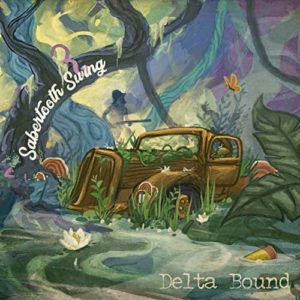Nothing against the music on Delta Bound, which presents an ambitious illustration of half a millennium of violent racial and cultural conflict shaping the history of the American South. The New Orleans sextet Sabertooth Swing and guests including Leon “Kid Chocolate” Brown, Jeffrey Broussard, Bruce “Sunpie” Barnes and Anna Laura Quinn expertly sift various mixtures of jazz, swing, blues, zydeco, Cajun and Caribbean styles, a deftly coherent survey from Jelly Roll Morton to Duke Ellington to Clifton Chenier.
But the most striking passage may well be one in which there is no music, just these words: “All summer his accordion rotted in a ditch, like an armadillo turning into a house payment.”
That striking image closes “What About This,” late Mississippi-Arkansas writer Frank Stanford’s poem of a fatal encounter between drunken yahoos and a musician, spoken here by New Orleans journalist Ben Myers. There is music, by New York composer Gabriel Richards, backing most of the reading. But it drops out for this last part, leaving an indelibly haunting impression.
It’s this moment at which this whole project—conceived and wrangled by Sabertooth guitarist Romain Beauxis with the band’s trombonist Chris Butcher and local writer Holly Devon, whose deep insights into Caribbean history and the African diaspora inform her poetic liner notes—comes into focus.
For that matter, many of the album’s highlights are spoken, with and without musical backdrops: anti-death penalty pleas from Sister Helen Prejean (the nun who wrote Dead Man Walking), a personal Cajun French account from Zachary Richard reflecting on the painful history tied to that dialect, a piece of the West African-originated epic of St. Malo read in Creole French by Cedric Watson and Sidney Bechet’s “Free Day,” recalling his grandfather’s tale of life in the fields and Sundays in Congo Square, read by Jeremy Thomas. And New Orleans poet Daiquiri René Jones—who also plays ethereal harp—reads his own “Primer,” about a bad day at a paint store, and far much more.
With this, Delta Bound draws a line from conquistador Hernando de Soto (via two diary entries from soldiers on his expedition) to Harry Connick Sr. (yes, Sr., the former New Orleans district attorney, called out by Prejean for stating that the death penalty was under-used).
And the music? It’s a hodgepodge, but with purpose. If the spoken passages are, to some extent, about conflict, the music is about confluence. In the opening title track popularized by Ellington, sung here by Sabertooth trumpeter Dan Ruch, some horn quotes of Wayne Shorter’s licks bridge eras and Barnes’ accordion bridges cultures. Similarly, city meets country in a sparklingly playful version of the Cajun celebration “Le Chanson de Mardi Gras,” alternating verses from Ruch’s horn—where an accordion or fiddle might be expected—with ones sung in French by Jamie Lynn Fontenot and Mariam McCracken, a.k.a. the Daiquiri Queens, And at the end, the street sounds of a St. Joseph’s night parade, with Big Queen Mary Kay of the Original Wild Tchoupitoulas chanting, are followed by the Sabertooth ensemble and singer Quinn covering Django Reinhardt’s melancholy “Nuages.”
It’s an incongruous, abrupt closing segue, perhaps. But consider that Reinhardt’s origin in Roma culture, also long subjected to violence, displacement and oppression, and it all ties together beautifully.
—Steve Hochman




